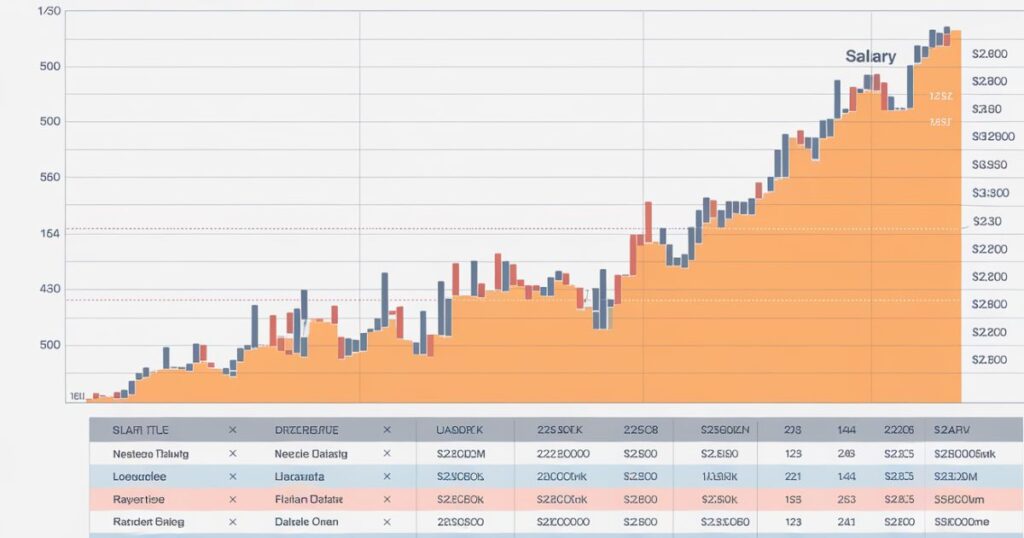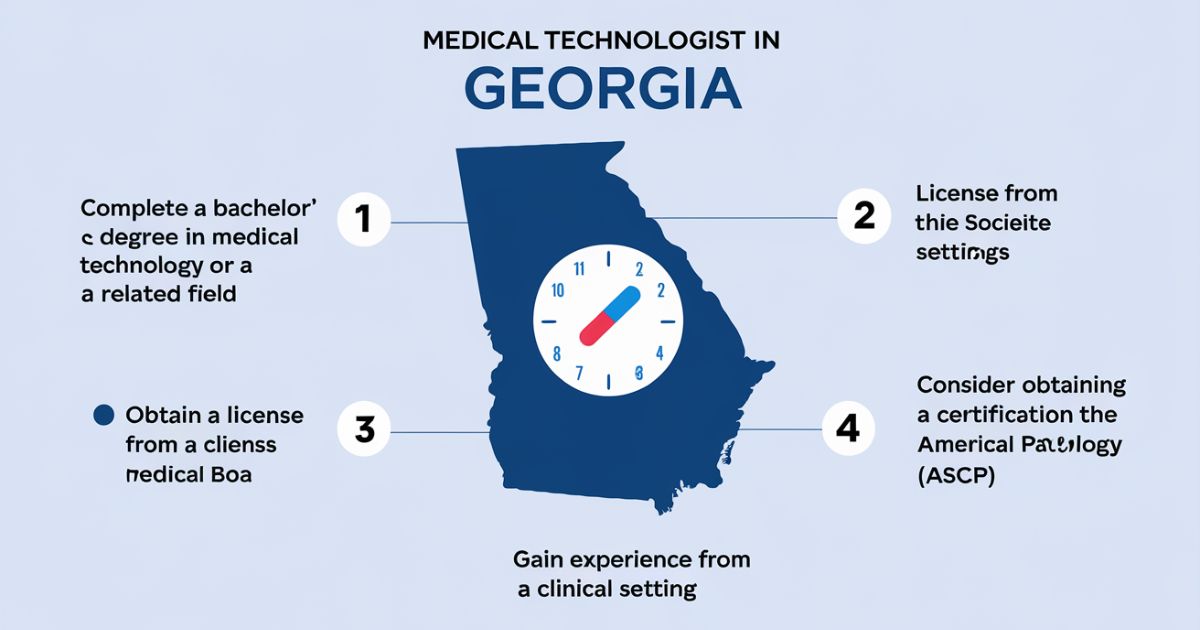What is a Medical Technologist?
A Medical Technologist (Med Tech) is a highly skilled healthcare professional who performs complex laboratory tests and procedures that are crucial for diagnosing, treating, and preventing diseases. These professionals work in various healthcare settings, from hospitals to private laboratories, playing a vital role in modern healthcare delivery. They are responsible for analyzing biological specimens, maintaining laboratory equipment, and ensuring accurate test results that physicians use to make critical patient care decisions.
Educational Requirements for Med Techs in Georgia
Bachelor’s Degree Programs
To become a Medical Technologist in Georgia, candidates must complete a bachelor’s degree in Medical Technology, Clinical Laboratory Science, or a related field. These programs typically take four years to complete and combine classroom instruction with hands-on laboratory training. The curriculum includes comprehensive coursework in clinical chemistry, hematology, microbiology, immunology, and molecular diagnostics. Students learn both theoretical concepts and practical applications, preparing them for the challenges of modern laboratory medicine.
Accredited Programs in Georgia
Georgia offers several accredited programs through prestigious institutions such as Georgia State University, Augusta University, and Armstrong State University. These programs are accredited by the National Accrediting Agency for Clinical Laboratory Sciences (NAACLS), ensuring they meet national educational standards. The accreditation process guarantees that programs maintain high educational quality and prepare students effectively for professional practice.
Clinical Training Requirements
Students must complete extensive clinical rotations as part of their education. These rotations typically last 6-12 months and provide hands-on experience in various laboratory departments. During this time, students work under the supervision of experienced Medical Technologists, gaining practical skills and knowledge essential for their future careers. Clinical rotations expose students to real-world laboratory situations and help them develop professional competencies.
Certification and Licensure
National Certification
After completing their education, aspiring Med Techs must obtain national certification. The most recognized certifications are offered by the American Society for Clinical Pathology (ASCP) Board of Certification. The main credential is the Medical Laboratory Scientist (MLS) certification, which requires passing a comprehensive examination covering all aspects of laboratory medicine. This certification demonstrates professional competency and commitment to excellence in the field.
Georgia State Requirements
Georgia requires all Medical Technologists to hold a valid license from the Georgia Board of Clinical Laboratory Science. To obtain this license, candidates must complete several requirements including holding a bachelor’s degree from an accredited program, passing the ASCP certification examination, submitting a complete application with required documentation, paying applicable licensing fees, and completing a criminal background check. The licensing process ensures that all practicing Med Techs meet the state’s professional standards.
Maintaining Certification and Licensure
Medical Technologists must maintain both their national certification and state license through ongoing professional development. This includes completing continuing education credits, staying current with laboratory techniques and technologies, renewing their license every two years, and meeting professional development requirements. Continuing education ensures that Med Techs remain competent and informed about advances in laboratory medicine.
Career Pathways and Advancement
Entry-Level Positions
New Med Techs typically begin their careers in general laboratory positions where they perform a variety of tests across different departments. These entry-level positions provide valuable opportunities to gain experience in various specialties and develop expertise in specific areas. During this initial phase, professionals learn to work independently, develop time management skills, and understand laboratory workflows. Many entry-level Med Techs rotate through different departments to gain broad experience before specializing.
Specialization Options
Medical Technologists can pursue specialization in various areas of laboratory medicine. Clinical Chemistry specialists focus on analyzing blood and body fluid specimens to determine chemical compositions and detect abnormalities. Hematology specialists study blood cells and related disorders. Blood Banking specialists work with blood products and transfusion services. Microbiology specialists identify and study microorganisms. Molecular Diagnostics specialists perform genetic testing and analysis. Immunology specialists study immune system responses. Cytogenetics specialists analyze chromosomes and genetic abnormalities.
Advanced Career Opportunities
Experienced Med Techs can advance to numerous leadership and specialized positions. Laboratory Supervisors oversee daily operations and staff management. Department Managers coordinate specific laboratory sections and implement policies. Laboratory Directors provide strategic leadership and oversee entire laboratory operations. Quality Assurance Managers ensure compliance with regulatory requirements and maintain testing standards. Laboratory Information Systems Specialists manage laboratory computer systems and data. Education Coordinators develop training programs and mentor new staff. Research Technologists contribute to scientific studies and method development.
Read This Post: How to Become a Lash Tech in Florida
Salary and Job Outlook in Georgia

Current Salary Ranges
Medical Technologists in Georgia earn competitive salaries that reflect their expertise and responsibilities. Entry-level positions typically start around $50,000-$60,000 annually, with experienced professionals earning $70,000-$90,000 or more. Factors affecting salary include years of experience, specialized certifications, management responsibilities, and geographic location within the state. Urban areas typically offer higher salaries to compensate for increased living costs.
Employment Prospects
The job outlook for Medical Technologists in Georgia remains exceptionally strong, with consistent growth projected through 2030. The aging population requires more medical testing services, driving demand for qualified professionals. Technological advances in laboratory testing create new opportunities for specialized expertise. The increasing emphasis on preventive care generates additional testing needs. The retirement of current laboratory professionals opens positions for new graduates. Healthcare expansion in Georgia continues to create new laboratory positions across the state.
Geographic Opportunities
Employment opportunities vary across Georgia’s regions, with the highest concentration in metropolitan areas. Atlanta offers numerous positions in large hospital systems and reference laboratories. Augusta provides opportunities in medical research and healthcare facilities. Savannah’s growing healthcare sector creates steady demand for laboratory professionals. Macon and Columbus maintain strong healthcare presences with consistent laboratory staffing needs. Rural areas often offer unique opportunities with competitive compensation packages to attract qualified professionals.
Skills and Qualities Required
Technical Skills
A successful Medical Technologist must possess comprehensive analytical abilities that encompass both theoretical knowledge and practical application. Strong mathematical aptitude is essential for performing complex calculations and analyzing data with precision. Computer proficiency has become increasingly important as laboratories adopt advanced information systems and automated equipment. Laboratory technique expertise must include thorough knowledge of safety protocols, specimen handling, and testing procedures. Problem-solving skills are crucial for troubleshooting equipment issues and resolving discrepant results. Equipment operation and maintenance abilities ensure accurate testing and optimal laboratory function.
Soft Skills
Communication abilities are vital for interacting with healthcare team members and explaining technical information clearly. Time management skills enable Med Techs to handle multiple priorities and meet crucial deadlines. The ability to work independently while maintaining accuracy is essential in laboratory settings. Stress management capabilities help professionals maintain composure during high-pressure situations and emergency testing needs. Teamwork and collaboration skills facilitate effective interaction with colleagues across all healthcare departments. Adaptability to changing technologies and procedures ensures continued professional growth. Professional integrity is paramount for maintaining testing quality and patient confidentiality.
Work Environment and Conditions
Laboratory Settings
Medical Technologists work in diverse environments that each present unique challenges and opportunities. Hospital laboratories operate continuously, providing critical testing services for patient care. Reference laboratories process high volumes of specialized tests from multiple facilities. Research facilities focus on developing new testing methods and conducting studies. Public health laboratories monitor community health trends and disease outbreaks. Private clinical laboratories serve outpatient facilities and physician offices. Physician office laboratories provide rapid testing for immediate patient care decisions.
Working Conditions
The role of a Medical Technologist involves specific physical and environmental considerations. Standing for extended periods is common while performing laboratory procedures. Working with biological specimens requires strict adherence to safety protocols and infection control procedures. Personal protective equipment, including gloves, masks, and laboratory coats, must be worn consistently. Possible exposure to infectious materials necessitates careful attention to safety procedures. Work schedules often include different shifts, weekends, and holidays to provide continuous laboratory services. The environment requires attention to detail and focus even during long working hours.
Professional Organizations and Resources
Professional Associations
The American Society for Clinical Laboratory Science (ASCLS) provides educational resources, advocacy, and professional development opportunities. The American Society for Clinical Pathology (ASCP) offers certification and continuing education programs. The Georgia Society for Clinical Laboratory Science (GSCLS) addresses state-specific concerns and provides local networking opportunities. The Clinical Laboratory Management Association (CLMA) supports laboratory leadership development and management expertise. These organizations collectively support professional growth and advancement in the field.
Networking Opportunities
Professional development occurs through various channels in the laboratory medicine field. Annual conferences and seminars provide opportunities to learn about new technologies and methodologies. Local chapter meetings facilitate professional connections and knowledge sharing. Online forums and discussion groups enable ongoing professional dialogue and problem-solving. Continuing education programs maintain professional competency and introduce new concepts. Professional workshops provide hands-on training in specific techniques or technologies. Mentorship programs support career development and professional growth.
Challenges and Rewards
Common Challenges
Medical Technologists face numerous professional challenges that require adaptability and resilience. Maintaining accuracy under pressure remains crucial as testing volumes increase and turnaround times decrease. Keeping up with technological advances requires continuous learning and adaptation to new methodologies. Managing high workload demands necessitates excellent organizational skills and efficiency. Dealing with critical situations requires quick thinking and confident decision-making. The balance between quality and efficiency must be maintained while meeting increasing productivity demands. Adapting to changing regulations requires constant attention to compliance and documentation requirements.
Career Rewards
The Medical Technology profession offers significant personal and professional satisfaction. Job security and stability remain strong due to consistent demand for laboratory services. Competitive compensation includes comprehensive benefits packages and opportunities for overtime. Professional advancement opportunities exist in technical specialization and management roles. The satisfaction of contributing to patient care provides meaningful work experiences. Continuous learning opportunities keep the work engaging and intellectually stimulating. The dynamic nature of laboratory medicine creates an exciting career environment.
Steps to Get Started
Planning Your Career Path
Beginning a Medical Technology career requires careful preparation and planning. Researching accredited programs helps identify the best educational opportunities. Meeting with program advisors provides insight into admission requirements and program expectations. Shadowing current Med Techs offers realistic perspectives on daily work responsibilities. Understanding program prerequisites ensures proper academic preparation. Planning financial resources includes exploring scholarships and financial aid options. Preparing for admission requirements involves maintaining competitive grades and completing necessary coursework.
Timeline Considerations
The journey to becoming a Medical Technologist follows a structured timeline. Four years of bachelor’s degree completion forms the educational foundation. Clinical rotations lasting 6-12 months provide essential practical experience. Certification preparation typically requires 2-3 months of focused study. The licensing process takes 1-2 months for documentation and approval. Job search and placement time varies but often takes several months. Additional time may be needed for specialized training or orientation in specific work settings.
Future Trends and Developments
Technological Advances
Laboratory medicine continues to evolve with technological innovation. Automation and robotics streamline routine testing procedures and improve efficiency. Digital pathology transforms traditional microscopy and specimen analysis. Artificial intelligence applications enhance result interpretation and quality control. Point-of-care testing expands laboratory services beyond traditional settings. Molecular diagnostics advances create new testing capabilities and methodologies. Personalized medicine approaches require increasingly sophisticated testing options.
Industry Changes
The laboratory field experiences ongoing transformation in response to healthcare evolution. Preventive medicine emphasis increases demand for screening and monitoring tests. Genetic testing expansion creates new specialized testing areas. Laboratory information systems integration improves result reporting and data management. Enhanced quality control measures ensure testing accuracy and reliability. Remote testing capabilities extend laboratory services to underserved areas. Sustainable laboratory practices address environmental concerns while maintaining testing quality.
This comprehensive guide provides aspiring Medical Technologists in Georgia with detailed information needed to pursue their career goals. Success in this field requires dedication to professional excellence, commitment to continuous learning, and passion for laboratory medicine. The combination of technical expertise, professional development, and personal growth creates rewarding career opportunities in this essential healthcare field.
The medical technology field continues to offer exciting opportunities for those interested in combining scientific knowledge with practical healthcare applications. As laboratory medicine advances, Medical Technologists play increasingly important roles in healthcare delivery and patient care. These professionals contribute significantly to medical diagnosis and treatment while enjoying stable, rewarding careers with numerous advancement opportunities.
Vividcrest admin brings expert insights in Tech and Gaming, offering up-to-date content, in-depth analysis, and trends to keep you ahead in the digital world.








